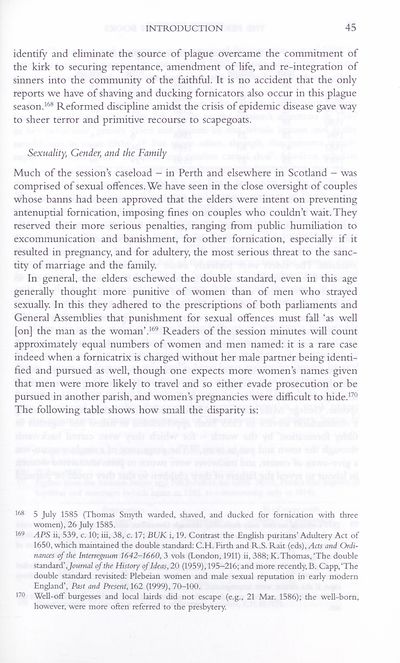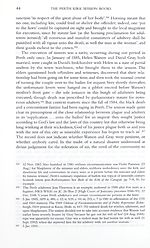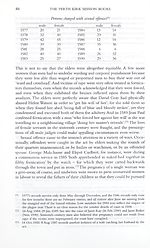Series 6 > Perth Kirk Session books, 1577-1590
(60) Page 45
Download files
Complete book:
Individual page:
Thumbnail gallery: Grid view | List view

INTRODUCTION
45
identify and eliminate the source of plague overcame the commitment of
the kirk to securing repentance, amendment of life, and re-integration of
sinners into the community of the faithful. It is no accident that the only
reports we have of shaving and ducking fornicators also occur in this plague
season.168 Reformed disciphne amidst the crisis of epidemic disease gave way
to sheer terror and primitive recourse to scapegoats.
Sexuality, Gender, and the Family
Much of the session’s caseload — in Perth and elsewhere in Scodand — was
comprised of sexual offences. We have seen in the close oversight of couples
whose banns had been approved that the elders were intent on preventing
antenuptial fornication, imposing fines on couples who couldn’t wait. They
reserved their more serious penalties, ranging from public humihation to
excommunication and banishment, for other fornication, especially if it
resulted in pregnancy, and for adultery, the most serious threat to the sanc¬
tity of marriage and the family.
In general, the elders eschewed the double standard, even in this age
generally thought more punitive of women than of men who strayed
sexually. In this they adhered to the prescriptions of both parliaments and
General Assembhes that punishment for sexual offences must fall ‘as well
[on] the man as the woman’.169 Readers of the session minutes will count
approximately equal numbers of women and men named: it is a rare case
indeed when a fornicatrix is charged without her male partner being identi¬
fied and pursued as well, though one expects more women’s names given
that men were more likely to travel and so either evade prosecution or be
pursued in another parish, and women’s pregnancies were difficult to hide.170
The following table shows how small the disparity is:
168 5 July 1585 (Thomas Smyth warded, shaved, and ducked for fornication with three
women), 26 July 1585.
169 APS ii, 539, c. 10; iii, 38, c. 17; BUK i, 19. Contrast the English puritans’Adultery Act of
1650, which maintained the double standard: C.H. Firth and R.S. Rait (eds), Acts and Ordi¬
nances of the Interregnum 1642-1660, 3 vols (London, 1911) ii, 388; K. Thomas, ‘The double
standard’. Journal of the History of Ideas, 20 (1959), 195-216; and more recently, B. Capp,‘The
double standard revisited: Plebeian women and male sexual reputation in early modern
England’, Past and Present, 162 (1999), 70-100.
170 Well-off burgesses and local lairds did not escape (e.g., 21 Mar. 1586); the well-born,
however, were more often referred to the presbytery.
45
identify and eliminate the source of plague overcame the commitment of
the kirk to securing repentance, amendment of life, and re-integration of
sinners into the community of the faithful. It is no accident that the only
reports we have of shaving and ducking fornicators also occur in this plague
season.168 Reformed disciphne amidst the crisis of epidemic disease gave way
to sheer terror and primitive recourse to scapegoats.
Sexuality, Gender, and the Family
Much of the session’s caseload — in Perth and elsewhere in Scodand — was
comprised of sexual offences. We have seen in the close oversight of couples
whose banns had been approved that the elders were intent on preventing
antenuptial fornication, imposing fines on couples who couldn’t wait. They
reserved their more serious penalties, ranging from public humihation to
excommunication and banishment, for other fornication, especially if it
resulted in pregnancy, and for adultery, the most serious threat to the sanc¬
tity of marriage and the family.
In general, the elders eschewed the double standard, even in this age
generally thought more punitive of women than of men who strayed
sexually. In this they adhered to the prescriptions of both parliaments and
General Assembhes that punishment for sexual offences must fall ‘as well
[on] the man as the woman’.169 Readers of the session minutes will count
approximately equal numbers of women and men named: it is a rare case
indeed when a fornicatrix is charged without her male partner being identi¬
fied and pursued as well, though one expects more women’s names given
that men were more likely to travel and so either evade prosecution or be
pursued in another parish, and women’s pregnancies were difficult to hide.170
The following table shows how small the disparity is:
168 5 July 1585 (Thomas Smyth warded, shaved, and ducked for fornication with three
women), 26 July 1585.
169 APS ii, 539, c. 10; iii, 38, c. 17; BUK i, 19. Contrast the English puritans’Adultery Act of
1650, which maintained the double standard: C.H. Firth and R.S. Rait (eds), Acts and Ordi¬
nances of the Interregnum 1642-1660, 3 vols (London, 1911) ii, 388; K. Thomas, ‘The double
standard’. Journal of the History of Ideas, 20 (1959), 195-216; and more recently, B. Capp,‘The
double standard revisited: Plebeian women and male sexual reputation in early modern
England’, Past and Present, 162 (1999), 70-100.
170 Well-off burgesses and local lairds did not escape (e.g., 21 Mar. 1586); the well-born,
however, were more often referred to the presbytery.
Set display mode to:
![]() Universal Viewer |
Universal Viewer | ![]() Mirador |
Large image | Transcription
Mirador |
Large image | Transcription
Images and transcriptions on this page, including medium image downloads, may be used under the Creative Commons Attribution 4.0 International Licence unless otherwise stated. ![]()
| Scottish History Society volumes > Series 6 > Perth Kirk Session books, 1577-1590 > (60) Page 45 |
|---|
| Permanent URL | https://digital.nls.uk/127281357 |
|---|
| Description | Over 180 volumes, published by the Scottish History Society, containing original sources on Scotland's history and people. With a wide range of subjects, the books collectively cover all periods from the 12th to 20th centuries, and reflect changing trends in Scottish history. Sources are accompanied by scholarly interpretation, references and bibliographies. Volumes are usually published annually, and more digitised volumes will be added as they become available. |
|---|


